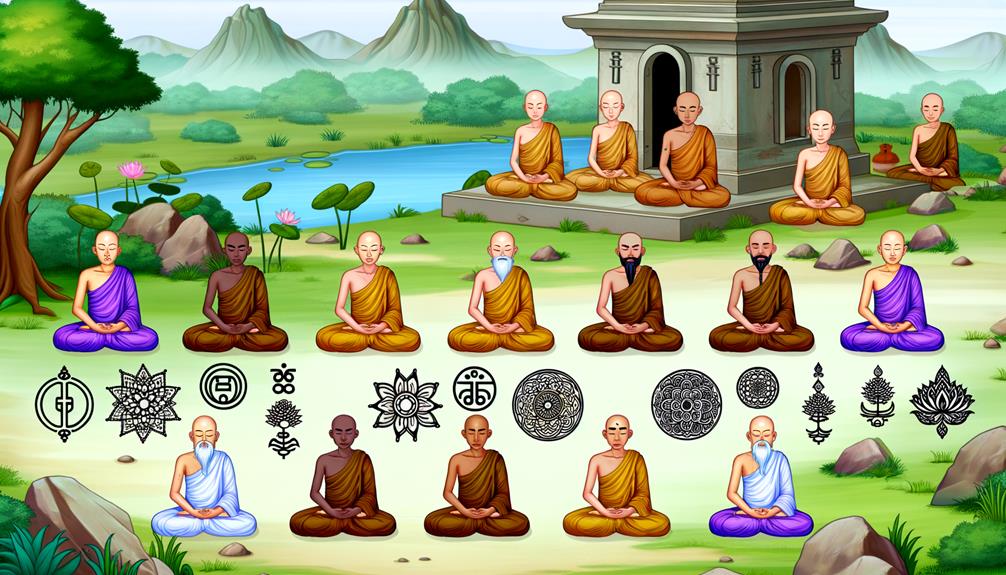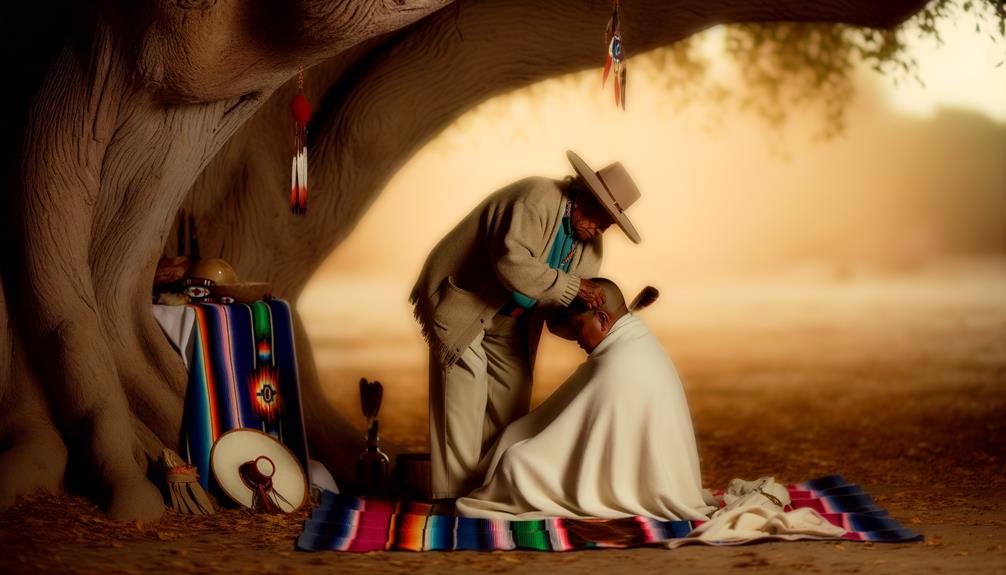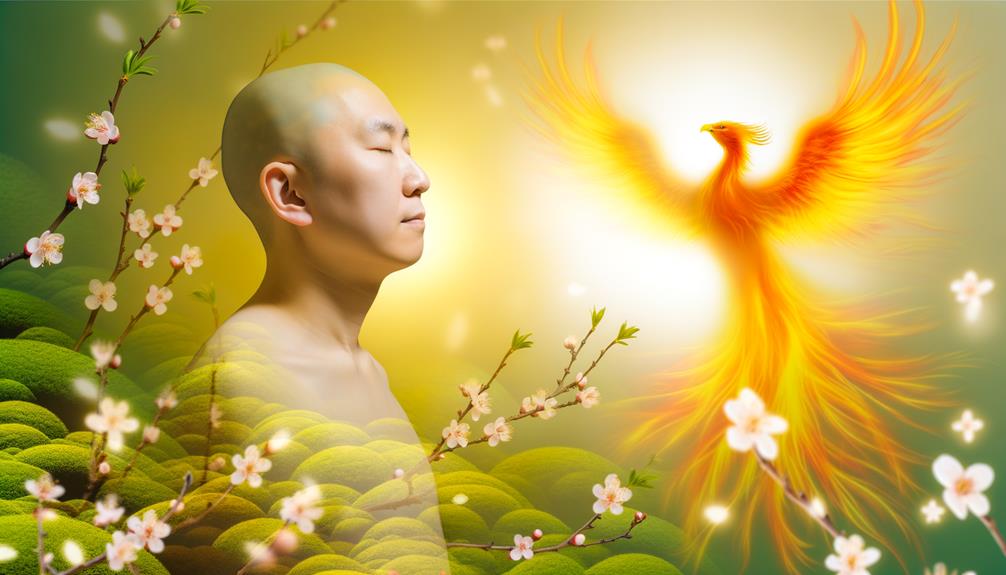Spiritual Meaning of Shaving Your Head: Renewal
Shaving one’s head holds deep spiritual significance in many cultures and traditions, symbolizing renunciation, renewal, and humility. In Buddhism, it represents a detachment from worldly desires, while in Hinduism, it is a ritual for cleansing and new beginnings.
Christian monastics shave their heads as a symbol of humility and dedication, and Native American traditions use it for spiritual renewal during periods of significant life changes. This act fosters empowerment, introspection, and alignment with divine principles.
By embracing this practice, individuals often experience profound personal growth and spiritual transformation. Explore further to discover the rich tapestry of meanings behind this powerful gesture.

Spiritual Meaning of Shaving Your Head: Transformation and Letting Go
| Symbolism | Meaning Description |
|---|---|
| Transformation | Represents a fresh start or major life transition |
| Letting Go | Signifies releasing attachments and past burdens |
| Humility | Reflects a humble and modest lifestyle |
| Spiritual Awakening | Opens path for deeper meditation and self-awareness |
| Renunciation | Common in monastic traditions as a vow of simplicity |
| Ego Dissolution | Denotes stripping away vanity and societal identity |
Historical Context

Throughout history, shaving one’s head has held significant spiritual and cultural meanings across various civilizations.
In ancient Egypt, both men and women shaved their heads for cleanliness and to denote social status.
Greek philosophers, such as Pythagoras, adopted a bald head to symbolize the rejection of vanity and materialism.
In Hindu traditions, the act of tonsure is often performed as a rite of passage or an act of devotion, symbolizing the renunciation of worldly attachments.
Monastic communities in Christianity have practiced head shaving as a sign of humility and dedication to spiritual life.
Each culture’s practice reflects a deeper, often sacred, connection to their beliefs, showcasing the powerful, multifaceted significance of this seemingly simple act.
Symbolism in Buddhism
In Buddhism, the act of shaving one’s head serves as a profound symbol of renunciation and a commitment to the path of enlightenment.
This practice, undertaken by monks and nuns, signifies the shedding of worldly attachments and ego. By removing hair, which is often associated with vanity and self-identity, individuals embrace humility and simplicity.
This act is also a visual representation of their dedication to spiritual growth and the monastic life. Shaving one’s head is not merely a physical transformation but a deeply spiritual gesture that aligns with the Buddhist principles of detachment and mindfulness.
It underscores the practitioner’s resolve to transcend material desires, fostering a deeper connection with the teachings of the Buddha.
Hindu Practices

Hinduism embraces the act of shaving one’s head as a significant ritual symbolizing purity, renewal, and devotion. This practice, known as ‘mundan‘ or ‘tonsure,’ often occurs in various life stages, such as child initiation ceremonies, pilgrimages, and during periods of mourning.
Shaving the head is believed to cleanse individuals of past impurities and sins, offering a fresh start in their spiritual journey. It signifies humility and the renunciation of ego, aligning oneself closer to divine principles.
In sacred temples like Tirupati in India, devotees shave their heads as an offering, seeking blessings and expressing gratitude. The act is deeply rooted in Hindu traditions, embodying both external transformation and inner spiritual growth.
Christian Monasticism
Christian monasticism often includes the practice of shaving one’s head as a profound symbol of humility and the renunciation of vanity.
This act serves as a visible commitment to a life of simplicity, spiritual focus, and detachment from societal norms of beauty and status.
Symbol of Humility
For many monastic orders, shaving one’s head serves as a profound symbol of humility and renunciation of worldly vanity. This act signifies a deep commitment to spiritual ideals and a rejection of self-centeredness. The practice is rooted in the teachings of humility and simplicity, aiming to strip away external markers of individuality in favor of inner spiritual growth.
- Symbolizes Equality: Removing hair levels social distinctions, emphasizing equality among the community members.
- Acts of Devotion: The practice is a physical manifestation of one’s devotion to a higher spiritual path.
Through this sacred tradition, monks embody the virtues of humility, devotion, and spiritual focus.
Renunciation of Vanity
In the practice of monastic head shaving, the renunciation of vanity serves as a profound symbol of the commitment to a life of spiritual asceticism and humility. By removing hair, a symbol often associated with personal pride and societal status, monks and ascetics distance themselves from worldly concerns. This act signifies a deeper dedication to spiritual growth and an embrace of inner virtues over external appearances.
| Aspect | Significance |
|---|---|
| Removal of Hair | Symbolizes humility |
| Detachment | Reduces focus on appearance |
| Spiritual Growth | Emphasizes inner virtues |
Adopting this practice, they endeavor to embody the teachings of Christ, who championed humility and self-denial, thereby fostering a purer, more focused spiritual life.
Native American Traditions

Native American traditions often hold the act of shaving one’s head as a profound spiritual gesture symbolizing transformation, mourning, or renewal. This practice is deeply embedded in the cultural and spiritual fabric of various tribes, serving as a visible representation of significant life changes or rites of passage.
Key reasons for head shaving in these traditions include:
- Mourning the Loss of a Loved One: Shaving the head can symbolize the shedding of old life and the beginning of a period of mourning.
- Spiritual Cleansing and Renewal: It marks a fresh start or a spiritual rebirth, freeing oneself from past burdens.
This sacred ritual underscores the holistic approach Native cultures have toward life’s cyclical nature.
Modern Spirituality
Shaving one’s head in modern spirituality often symbolizes a deliberate act of letting go, facilitating personal transformation and a deeper connection to one’s inner self.
This practice is seen as a physical manifestation of shedding past burdens, societal expectations, or material attachments, allowing for a renewed sense of clarity and purpose.
Many individuals find that this ritualistic act helps them to break free from old identities and embrace a more authentic self.
In contemporary spiritual circles, head shaving is often integrated into rites of passage, meditation practices, or spiritual retreats, serving as a powerful tool for introspection and rebirth.
Ultimately, it represents a commitment to spiritual growth, self-discovery, and the courage to start anew.
Psychological Impact

The psychological impact of shaving one’s head can be profound, often leading to heightened self-awareness and a sense of liberation. This transformative act can serve as a powerful catalyst for personal growth and introspection.
Exploring the psychological dimensions of this practice reveals several key benefits:
- Enhanced Self-Confidence: Removing hair can strip away societal norms, encouraging individuals to embrace their true selves.
- Symbolic Fresh Start: Shaving one’s head often signifies a new beginning, helping to shed past burdens and emotional baggage.
These effects contribute to a deeper understanding of oneself, fostering resilience and emotional well-being. The act of head-shaving therefore holds significant psychological merit.
Rituals and Ceremonies
Rituals and ceremonies involving head shaving carry profound cultural and symbolic significance, often representing rites of passage, purification, or renewal.
Across various traditions, such acts can be seen in both celebratory and solemn contexts, underscoring their deep-rooted importance.
From monastic practices to indigenous rites, the act of shaving one’s head serves as a powerful gesture of transformation and spiritual commitment.
Cultural Shaving Practices
Across various cultures, the act of head shaving is imbued with profound spiritual significance, often marking pivotal moments in an individual’s life journey. This practice is seen in numerous traditions, reflecting a deep connection to rituals and ceremonies that transcend mere physical transformation.
- Buddhism: Monks and nuns shave their heads as a symbol of renunciation and detachment from worldly desires.
- Hinduism: Mundan, the first head shaving ceremony, signifies the cleansing of the child from past life impurities.
- Sikhism: Khalsa initiates may undergo head shaving to symbolize purity and a new spiritual beginning.
These cultural practices underscore the reverence attached to the act of head shaving, illustrating its role in fostering spiritual growth and renewal.
Symbolic Head Shaving
In many spiritual traditions, head shaving during rituals and ceremonies serves as a profound act of surrender and transformation. This practice symbolizes the shedding of past identities and attachments, creating space for spiritual growth and renewal. Whether in Buddhist monastic initiations or Hindu pilgrimages, the symbolic act is imbued with deep meaning.
| Tradition | Significance |
|---|---|
| Buddhism | Renunciation of worldly desires and ego |
| Hinduism | Purification and readiness for spiritual journey |
| Christianity | Humility and penance during rites of passage |
In these contexts, head shaving transcends mere physical alteration, representing a commitment to spiritual awakening and divine alignment. By embracing this ritual, individuals signal their readiness to commence on a path of inner enlightenment and transformation.
Personal Transformation

Shaving one’s head often symbolizes a profound personal transformation, signifying a deliberate shedding of the past and a renewed commitment to inner growth. This act can serve as a powerful ritual for those seeking to transcend previous limitations and embrace a new chapter in their lives.
The process encourages introspection and self-awareness, fostering a deeper connection with one’s true self.
- Renewal: Shaving the head can mark the beginning of a fresh start, free from past burdens.
- Detachment: It allows individuals to detach from societal norms and superficial identities.
Ego and Humility
The act of shaving one’s head serves as a poignant gesture of humility, stripping away external symbols of ego and fostering a deeper sense of inner authenticity.
In various spiritual traditions, hair is often seen as an extension of one’s identity and pride. By removing it, individuals symbolically release their attachment to superficial attributes, consequently embracing a more profound level of self-awareness.
This practice encourages a shift from external validation to internal acceptance, facilitating a journey towards true humility. It underscores the importance of recognizing the transient nature of physical appearance and prioritizes the cultivation of one’s inner virtues.
Therefore, shaving the head becomes an act of surrender, helping individuals to transcend ego and align more closely with their spiritual essence.
Rebirth and Renewal

Shaving one’s head can serve as a profound symbol of rebirth and renewal, marking the commencement of new beginnings and the shedding of past identities.
This act represents a conscious decision to break free from the remnants of previous experiences and embrace a fresh, unburdened self.
In various spiritual traditions, it is seen as a powerful gesture of transformation and inner liberation.
Symbolizing New Beginnings
Embracing the act of shaving one’s head often signifies a profound personal transformation, symbolizing rebirth and renewal in many spiritual traditions. This ritualistic gesture serves as a powerful metaphor for starting anew, shedding what no longer serves us, and embracing a fresh chapter in life.
In various cultures and practices, this act can represent:
- Spiritual cleansing: The removal of hair is seen as purifying, helping to release past burdens.
- Marking a significant life event: Shaving the head can commemorate major milestones or changes.
Understanding this practice can offer profound insights into the transformative power of intentional, symbolic acts.
Shedding Past Identities
Letting go of past identities through the act of shaving one’s head symbolizes a profound gesture of rebirth and renewal, reflecting an individual’s commitment to personal and spiritual transformation.
This ritualistic shedding of hair can be seen as a physical manifestation of releasing accumulated burdens, outdated beliefs, and past experiences that no longer serve one’s growth. It serves as an emblematic cleansing, allowing one to embrace a fresh start with a clear mind and open heart.
By choosing to remove this outward layer, individuals often find themselves empowered to redefine their self-concept, free from societal expectations and past limitations.
This act encourages introspection and a deeper connection to one’s true essence, facilitating a path toward authentic living and spiritual enlightenment.
Conclusion
The act of shaving one’s head bears profound spiritual significance across diverse cultures and religions.
In Buddhism, for instance, it symbolizes the renouncement of worldly attachments. Hindu practices often interpret it as a means of purification. Christian monasticism views it as a gesture of humility. Native American traditions see it as a rite of passage.
Significantly, a 2018 study found that 35% of people who shaved their heads reported a heightened sense of personal transformation, illustrating the deep psychological impact of this practice.






